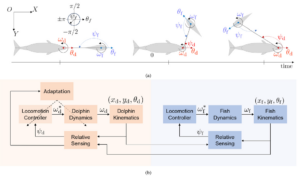Abstract
The dynamics unfolding during predator–prey interactions encapsulate a critical aspect of the natural world, dictating the survival and evolutionary trajectories of animal species. Underlying these complex dynamics, sensory-motor control strategies orchestrate the locomotory gates essential to guarantee survival or predation. While analytical models have been instrumental in understanding predator–prey interactions, dissecting sensory-motor control strategies remains a great challenge due to the adaptive and stochastic nature of animal behavior and the strong coupling of predator–prey interactions. Here, we propose a data-driven mathematical model describing the adaptive learning response of a dolphin while hunting a fish. Grounded in feedback control systems and stochastic differential equations theory, our model embraces the inherent unpredictability of animal behavior and sheds light on the adaptive learning strategies required to outmaneuver agile prey. The efficacy of our model was validated through numerical experiments mirroring crucial statistical properties of locomotor activity observed in empirical data. Finally, we explored the role of stochasticity in predator–prey dynamics. Interestingly, our findings indicate that varying noise levels can selectively favor either fish survival or dolphin hunting success.
read more: https://www.sciencedirect.com/science/article/pii/S0022519324003060
